 W
W"The Belgian Massacres. To the Workmen of Europe and the United States" is a minor political pamphlet written by Karl Marx in May 1869. In it, Marx responds to the violent repression of strikes which had occurred in Belgium the previous month.
 W
W"The Civil War in France" was a pamphlet written by Karl Marx, as an official statement of the General Council of the International on the character and significance of the struggle of the Communards in the Paris Commune.
 W
WThe Class Struggles in France, 1848 to 1850 was a set of articles written by Karl Marx for the newspaper Neue Rheinische Zeitung in 1850. The works were collated and republished in 1895 by Friedrich Engels.
 W
WCritique of Hegel's Philosophy of Right is a manuscript written by German political philosopher Karl Marx in 1843.
 W
WThe Critique of the Gotha Programme is a document based on a letter by Karl Marx written in early May 1875 to the Social Democratic Workers' Party of Germany (SDAP), with whom Marx and Friedrich Engels were in close association.
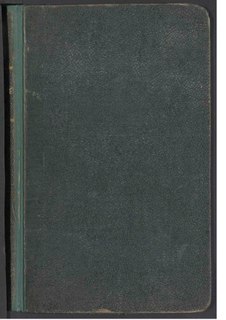 W
WCapital. Volume I: The Process of Production of Capital is a treatise written in the tradition of classical political economy first published on 14 September 1867 by German communist, economist, and political theorist Karl Marx. The product of a decade of research and redrafting, the book applies class analysis to capitalism focusing upon production processes, making the capitalist mode of production historically specific. Particularly, the sources and forms of surplus value in the context of explaining the dynamics of capital accumulation characterizing economic development over a long period of time are key themes developed analytically throughout the work.
 W
WThe Economic and Philosophic Manuscripts of 1844, also referred to as the Paris Manuscripts or as the 1844 Manuscripts, are a series of notes written between April and August 1844 by Karl Marx, published posthumously in 1932.
 W
WThe Eighteenth Brumaire of Louis Napoleon is an essay written by Karl Marx between December 1851 and March 1852, and originally published in 1852 in Die Revolution, a German monthly magazine published in New York City and established by Joseph Weydemeyer. Later English editions, such as an 1869 Hamburg edition, were entitled The Eighteenth Brumaire of Louis Bonaparte.
 W
WThe Grundrisse der Kritik der Politischen Ökonomie is a lengthy, unfinished manuscript by the German philosopher Karl Marx. The series of seven notebooks was rough-drafted by Marx, chiefly for purposes of self-clarification, during the winter of 1857–8. Left aside by Marx in 1858, it remained unpublished until 1939.
 W
WDas Kapital, also called Capital. A Critique of Political Economy, is a foundational theoretical text in materialist philosophy, economics and politics by Karl Marx. Marx aimed to reveal the economic patterns underpinning the capitalist mode of production in contrast to classical political economists such as Adam Smith, Jean-Baptiste Say, David Ricardo and John Stuart Mill. While Marx did not live to publish the planned second and third parts, they were both completed from his notes and published after his death by his colleague Friedrich Engels. Das Kapital is the most cited book in the social sciences published before 1950.
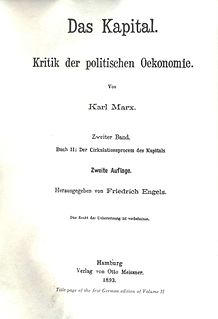 W
WCapital, Volume II: The Process of Circulation of Capital is the second of three volumes of Capital: Critique of Political Economy. It was prepared by Friedrich Engels from notes left by Karl Marx and published in 1885.
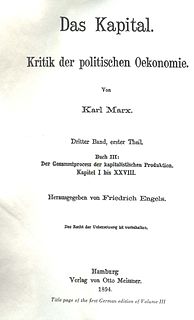 W
WCapital, Volume III, subtitled The Process of Capitalist Production as a Whole, is the third volume of Capital: Critique of Political Economy. It was prepared by Friedrich Engels from notes left by Karl Marx and published in 1894.
 W
W"Notes on James Mill" is a text written by Karl Marx in 1844, originally part of the so-called "Paris Notebooks". In it Marx criticizes parts of James Mill's Elements of Political Economy. It forms the foundation for what would later become his Economic and Philosophical Manuscripts of 1844.
 W
W"On the Jewish Question" is a work by Karl Marx, written in 1843, and first published in Paris in 1844 under the German title "Zur Judenfrage" in the Deutsch–Französische Jahrbücher. It was one of Marx's first attempts to develop what would later be called the materialist conception of history.
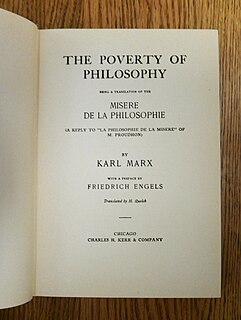 W
WThe Poverty of Philosophy is a book by Karl Marx published in Paris and Brussels in 1847, where he lived in exile from 1843 until 1849. It was originally written in French as an answer to the economic and philosophical arguments of French anarchist Pierre-Joseph Proudhon set forth in his 1846 book The System of Economic Contradictions, or The Philosophy of Poverty.
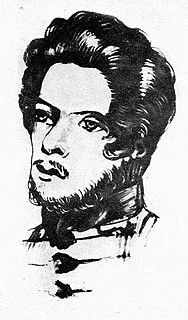 W
WScorpion and Felix, A Humoristic Novel is the only comedic fictional story to have been written by Karl Marx. Written in 1837 when he was 19 years old, it has remained unpublished. It was likely written under the influence of The Life and Opinions of Tristram Shandy, Gentleman by Laurence Sterne.
 W
WTheories of Surplus Value is a draft manuscript written by Karl Marx between January 1862 and July 1863. It is mainly concerned with the West European theorizing about Mehrwert from about 1750, critically examining the ideas of British, French and German political economists about wealth creation and the profitability of industries. At issue are the source, forms and determinants of the magnitude of surplus-value and Marx tries to explain how after failing to solve basic contradictions in its labour theories of value the classical school of political economy eventually broke up, leaving only "vulgar political economy" which no longer tried to provide a consistent, integral theory of capitalism, but instead offered only an eclectic amalgam of theories which seemed pragmatically useful or which justified the rationality of the market economy.
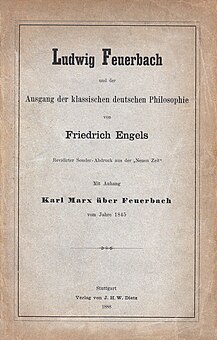 W
WThe "Theses on Feuerbach" are eleven short philosophical notes written by Karl Marx as a basic outline for the first chapter of the book The German Ideology in 1845. Like the book for which they were written, the theses were never published in Marx's lifetime, seeing print for the first time in 1888 as an appendix to a pamphlet by his co-thinker Friedrich Engels. The document is best remembered for the epigrammatic 11th thesis and final line: "Philosophers have hitherto only interpreted the world in various ways; the point is to change it."
 W
W"Value, Price and Profit" is a transcript of an English-language lecture series delivered to the First International Working Men's Association on June 20 and 27, 1865 by Karl Marx. The text was written between the end of May and June 27 in 1865, while Capital, Volume I was in preparation and one year before it was published. Value, Price and Profit was published as a book in 1898 by Marx's daughter Eleanor Marx Aveling.
 W
W"Wage Labour and Capital" is an essay on economics by Karl Marx, written in 1847 and first published in articles in the Neue Rheinische Zeitung in April 1849. It is widely considered the precursor to Marx’s influential treatise Das Kapital.